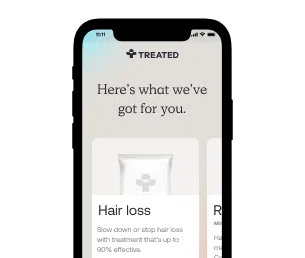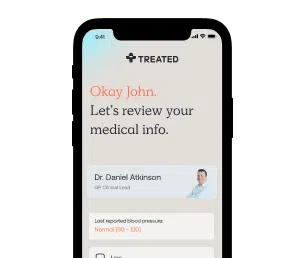COPD
Treatments to help you breathe easier.
Secure delivery
UK clinicians
Chronic obstructive pulmonary disease (COPD) happens when your airways and lungs become damaged and inflamed. COPD is often caused by exposure to harmful chemicals, for example smoking, pollution or work based hazards.
Always ensure you have help close at hand; order COPD treatment online.
COPD is the general term used for a range of chronic and debilitating respiratory illnesses that affect the lungs and airways, making it harder to breathe.
Common examples of COPD are chronic bronchitis and emphysema, which are characterised by difficulty in breathing, lung or airflow restrictions and coughing. But there can be a range of other symptoms that vary in severity and differ from person to person.
COPD is a progressive condition which tends to get worse over time. Treatment can help to slow down COPD worsening, and limit symptoms like inflammation and tightening of the airways.
Whilst it can be caused or made worse by a range of factors, smoking is the leading cause of COPD.
But there’s also increasing evidence to suggest that air pollution is also a major cause, especially in developing countries - where an estimated 25-45% of people with COPD have no history of smoking. Genetics can also contribute, and those with the genetic condition Alpha-1 antitrypsin deficiency are at greater risk of developing COPD - a condition thought to be more common than diagnosis figures suggest.
COPD is quite common worldwide. Historically, it’s been more widespread in men than women - according to one analysis of figures that covered 2004 to 2015, the overall prevalence in men aged 30 years or more was estimated to be around 15.7%, compared to 9.9% in women. It’s been theorised that this was because men were more likely to be smokers.
But recent figures suggest that globally, the condition is more common in women than in men (56% vs 44%). It’s not known exactly why, but one study has noted that a higher prevalence in women in self-reported data sets (maybe suggesting that women are more likely to go and seek advice and diagnosis for symptoms than men.)

How we source info.
When we present you with stats, data, opinion or a consensus, we’ll tell you where this came from. And we’ll only present data as clinically reliable if it’s come from a reputable source, such as a state or government-funded health body, a peer-reviewed medical journal, or a recognised analytics or data body. Read more in our editorial policy.
COPD is mainly caused by exposure to harmful particles and gases, which leads to difficulty breathing. It’s a chronic inflammation of the airways, lung tissue, alveoli and blood vessels, which narrows the airways. This can cause the overproduction of thick mucus, the loss of alveoli (tiny air sacs in the lungs that help exchange oxygen and CO2) and high blood pressure. It can also lead to other chronic lung problems if it’s not treated.
Symptoms of COPD can vary from person to person. But the main symptoms many people get include:
Other common symptoms may include:
Less common symptoms can also include:
Without effective treatment and lifestyle changes, COPD becomes a degenerative condition: sometimes called exacerbation of chronic obstructive pulmonary disease (ECOPD). It’s also been linked to other related diseases such as lung cancer, recurrent pneumonia, respiratory failure, and anemia.
People suffering with COPD are also more likely to catch common colds, influenza, and pneumonia. It’s currently estimated to be the third-leading cause of death in the world, and responsible for 6% of all world deaths.
Quitting smoking and reducing exposure to lung irritants instantly decreases the risk of infections and other conditions. It’s also recommended that everyone who has COPD has a pneumonia vaccination, as well as an annual flu shot, to reduce their risk of infection.

How we source info.
When we present you with stats, data, opinion or a consensus, we’ll tell you where this came from. And we’ll only present data as clinically reliable if it’s come from a reputable source, such as a state or government-funded health body, a peer-reviewed medical journal, or a recognised analytics or data body. Read more in our editorial policy.

How we source info.
When we present you with stats, data, opinion or a consensus, we’ll tell you where this came from. And we’ll only present data as clinically reliable if it’s come from a reputable source, such as a state or government-funded health body, a peer-reviewed medical journal, or a recognised analytics or data body. Read more in our editorial policy.
Have something specific you want to know? Search our info below, or ask our experts a question if you can’t find what you’re looking for.
Chronic obstructive pulmonary disease in non-smokers. Lancet (London, England), 374(9691), 733–743.
Alpha-1 antitrypsin deficiency is not a rare disease but a disease that is rarely diagnosed. Environmental Health Perspectives, 111(16), pp.1851–1854.
Global prevalence of chronic obstructive pulmonary disease: systematic review and meta-analysis. Eastern Mediterranean health journal = La revue de sante de la Mediterranee orientale = al-Majallah al-sihhiyah li-sharq al-mutawassit, 25(1), 47–57.
COPD Surveillance—United States, 1999-2011. Chest, 144(1), pp.284–305.
Prevalence and incidence of COPD in smokers and non-smokers: the Rotterdam Study. European journal of epidemiology, 31(8), 785–792.

Nebuliser with two ingredients to help you breathe easier.

Instant relief from COPD symptoms. Breath activated inhaler.

Easy-to-use capsule inhaler for COPD that's breath activated.

Bronchodilator that provides twenty-four-hour COPD relief. Combines an LABA with an anticholinergic.

Powder inhaler with three active ingredients to improve COPD.

Single-dose, inhaled powder capsule for COPD. Bronchodilator that lasts twenty-four-hours.

Breaks down mucus – making it easier to clear when you cough. Two capsules, three times a day.

Once-a-day inhaler that relaxes muscles in your lungs, to treat symptoms of COPD.

An easy-to-use preventer inhaler for long term asthma symptoms.

Registered with GMC (No. 4624794)
Meet Daniel
Registered with GPhC (No. 2202465)
Meet Sanjeda
Registered with GPhC (No. 2070724)
Meet Craig
Always read the leaflet that comes with your medication and tell us about any side effects you get.
We know health, but you know you.
Our experts tell you what’s safe, but you decide what’s best.
Answer a few questions and tell us about yourself. Get tailored advice from our clinicians so you can choose better.

Choose your treatment and how often you have it delivered.

We know things change. It’s the nature of life. We’ll check in regularly to make sure your treatment is still right for you.
Pause. Change. Skip. Start again. Any time you like.
Here are some other things we can help with.
Choose from our range of tablets and solutions. Get ongoing care and support from our experts.
Stop smoking treatments that can help you kick the habit forever, and reduce your risk of disease.
Tablets or injections. Tailored weight loss treatments combined with ongoing support from our experts.
We're making healthcare more about you. Sign up to our newsletter for personalised health articles that make a difference.
Disclaimer: The information provided on this page is not a substitute for professional medical advice, diagnosis, or treatment. If you have any questions or concerns about your health, please talk to a doctor.
We couldn't find what you're looking for.
Here's everything we treat. Or, if you're looking for something we don't have yet, you can suggest something.
If there’s a particular treatment or condition you’re looking for, tell us and we’ll look into it for you.
Submit your question here, or tell us if you’ve found an issue on our site.
We’ll get back to you very soon. We aim to respond to all queries in one working day.
You’re signed up to our newsletter. Keep an eye on your inbox for our latest update.
By clicking 'Subscribe now' you're agreeing to our Privacy Policy.
We’ve sent you an email asking you to confirm your email address.